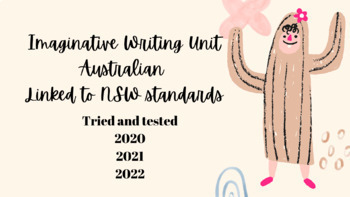Narrative Imaginative Writing Unit 2023 Stage 2 Year 3 Year 4 Australian NSW
- Google Docs™

Description
Students will be engaged with frequent experiences of reading & viewing, writing & composing, in purposeful and contextualised ways across the curriculum. This unit focusses on the english concept of 'Themes'
What is a Theme?
"A theme is a statement about life, arising from the interplay of key elements of the text such as plot, character, setting and language. These work together in a coherent way to achieve the purpose of the text.
Theme differs from the topic of a text (war, the sea) or an idea addressed by a text (prejudice, friendship) in that the theme conveys an attitude or value about an idea (By accepting difference we are enriched. True friendship survives adversity).
At its most basic level a theme may be regarded as the message or even the moral of a text. Themes may be used for a didactic purpose or may add a philosophical dimension, inviting us to think about our place in the world. A theme is a statement about human experience that is profound and which responders may accept or reject, depending on their own worldview.
WHY IT IS IMPORTANT
Identifying themes is a higher order skill, moving students beyond the stated details of the text to consider the ideas implied by these details. By explaining how themes emerge students come to an understanding of how individual elements of a text cohere to serve a theme.
Understanding the themes of a text gives students insight into what is valued by a culture and the extent to which they may identify with, accept or challenge these values." - http://www.englishtextualconcepts.nsw.edu.au/content/theme
The unit follows a 3-4 week cycles of:
Wk 2,5,8 Explore
Immersing students with examples of texts allowing them to explore, familiarise and interact with those texts.
Wk 3,6,9 Engage
Students identify and use textual features through opportunities to innovate on exemplar texts.
Wk 4,7, Elaborate
Students invent their own texts using the knowledge, skills, and understandings developed throughout the unit.
Wk 10 Celebrate
Student work is celebrated and shared with the school community (No lessons planned this week)
Balanced lesson sequences using the Gradual Release of Responsibility Model will include elements of modelled, shared, guided and independent practice in the processes of: responding to, composing and engaging personally with texts; developing and applying contextual knowledge and understanding, and using language forms and features. All lessons will include elements of whole class, direct instruction (modelling & sharing) AND small group or individual learning (guided & independent) using quality texts.
Types of Text: Imaginative
Text Requirements: Print texts, Visual texts, Media, digital multimedia
Text Experiences: Texts which are widely regarded as quality literature an appropriate range of digital texts, including film, media and multimedia
- Imaginative writing unit (Focussing on the English concept of 'Themes')
- English Content included in the unit
- Learning Intentions and Success Criteria's
- Lessons planned for a 10 week term.
- Engaging resources
- Flexible teaching structure
- Tested and modified over two years
- Gradual release of responsibility writing structure
- Shared Reading leads into writing tasks.
- Focusses on identifying themes in stories
- Focuses on writing using different themes
- Assessments for, as, of learning
- Flexibility to choose your own final assessment task with suggestions.
- Includes lessons to support co-constructed 'Bump it up' wall criteria
- Allows for differentiation
- Includes area to record adjustments
^^^^^Click the preview to see lesson samples^^^^^^
PLEASE NOTE THIS UNIT FOCUSSES MAINLY ON WRITING BUT DOES LINK IN OTHER ENGLISH AREAS OF SHARED READING, G & P AND SPELLING.




